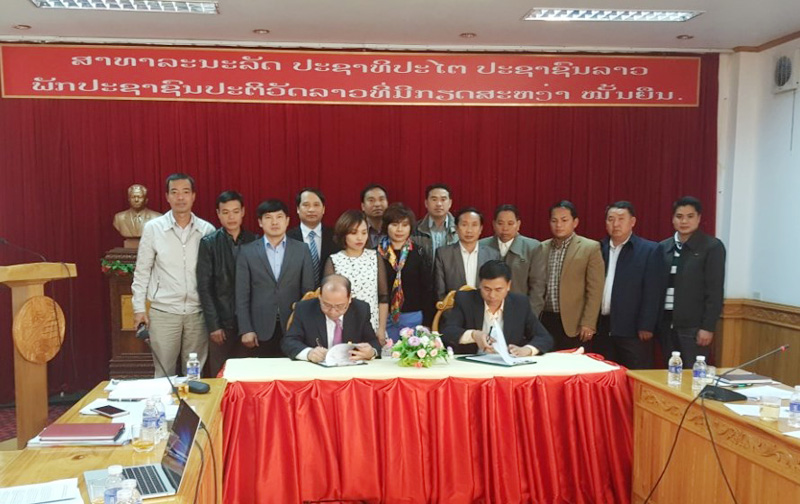
(HBO) – The minutes on the content of a project to build a high school in Hua Muong district in the Lao province of Houaphan has been signed by Bui Duc Hinh, Director of the provincial Hoa Binh Department of Planning and Investment, and Maloi Phimmasone, Deputy Director of the provincial Houaphan Department of Planning and Investment.
The project is implemented on the basis of
the agreement between the Lao and Vietnamese Governments on financial
regulations and managing projects using Vietnamese non-refundable aid for Laos.

Leaders of the provincial Departments of Planning and Investment of Hoa Binh
and Houaphan provinces signed the minutes on the content of Hua Muong’s
district high school construction project in the Lao province of Houaphan.
The two sides agreed to build and equip the school with comprehensive equipment
and technical infrastructure, which is expected to accommodate 1,000 students
at the secondary and high school levels by 2020.
The school will include two two-storey buildings, with a combined floor area of
1,350 sq. metres. Each building has eight class rooms, accommodating 30-35
students. It also comprises a multi-task house, an administrative office, a
library, dormitories, toilets, gates, and guard stations, serving teaching and
learning activities at the school.
The Lao side will be responsible for granting land for the project and ensuring
security and order in the area, supplying relevant information and data for the
project implementation, land clearance compensation (if any); marking border of
the targeted area; pricing materials for cost projection (if any).
Meanwhile, the Vietnam side will select contractors in consultancy, design,
construction, procurement, and implementation of the project. Payment will be
made in accordance with the current regulations.
The Departments of Planning and Investment of Vietnam’s Hoa Binh province and
Laos’s Houaphan pronvce will be the coordinators of the project. Hoa Binh
province’s ODA Projects Management Board is responsible for carrying out the
project.
The two departments will advise the two provinces’ leaders on signing an
agreement on the project in the coming time./.
The Standing Board of the Hoa Binh provincial Party Committee has agreed in principle on a proposal by the Standing Board of the Party Committee of Hoa Binh city to gather feedback on the city’s 1:2000 zoning plan, which forms part of its broader urban development strategy.
Hoa Binh province has made notable progress in public administration reform and digital government development, with the satisfaction index among citizens and businesses reaching over 84%, according to recent government evaluations.
Thanks to great efforts by local authorities in recent times, the governance and public administration performance of Mai Chau district has been significantly improved.
In the afternoon of June 6, the Party Committee, the People's Council, the People's Committee and the Fatherland Front of Lac Son district solemnly held a meeting to celebrate the 139th anniversary of the district's founding (1886–2025) and the 79th anniversary of the establishment of the district's Party Committee (1946–2025). There was the attendance of Mr. Bui Van Thang, the Vice Chairman of the Provincial People's Council; Mr. Quach Tat Liem, the Vice Chairman of the Provincial People's Committee; Ms. Dang Bich Ngoc, the Deputy Head of the National Assembly Delegation of the province; as well as the former leaders of the province and district through various periods, who are the natives of the district.
Implementing the Politburo’s Resolution No. 57-NQ/TW on breakthroughs in science – technology, innovation, and digital transformation is a golden opportunity for the northern mountainous province of Hoa Binh to renew growth model, improve competitive edge and shorten digital gap.
Resolution 57-NQ/TW, issued by the Politburo on December 22, 2024, identifies sci-tech, innovation, and digital transformation as strategic breakthroughs to build a developed and prosperous nation. In Hoa Binh province, this spirit is not just a slogan, it’s being put into action through concrete initiatives that form a "new development triangle”: digital citizenship, digital economy, and digital administration.



